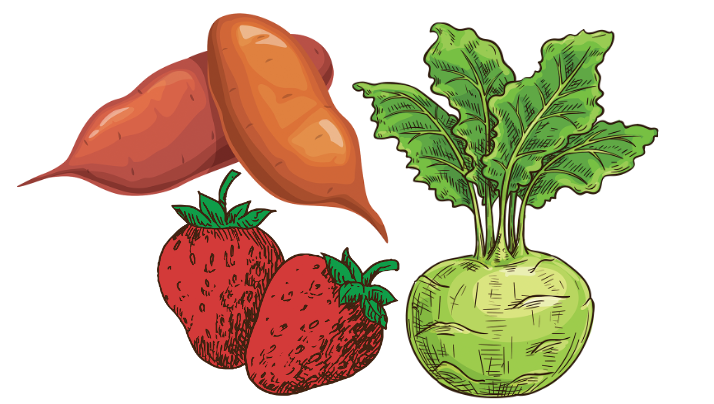Nutrition from the Garden

When I go out to schools, I often ask students, “Why is it important to eat fruits and vegetables?” The typical response I get is “it’s good for you,” or “they’re healthy,” but very few students or adults for that matter can tell me anything specific. I decided to ask my coworker, Cheri Granillo to give me some specific nutrition information and health benefits of some common crops grown in the school garden. Cheri manages the PhytoMedicine Extension program at PHHI and is a nurse practitioner. She specifically pointed out several phytonutrients that are found in these plants and their health benefits. The names of the phytonutrient compounds may be unfamiliar now, but as more health benefits are connected to these compounds, expect their names to become a more common part of the health vernacular.
Sweet potatoes for eye + skin health
Sweet potatoes contain carotenoids such as lutein, zeaxanthin and beta carotene. Lutein and zeaxanthin are also found in the macula, the area of the retina that gives up sharp eyesight. Age related macular degeneration is the most common cause of blindness in older adults. Eating sweet potatoes can increase the amount of lutein and zeaxanthin in the macula and reduce the risk of developing age-related macular degeneration and even decrease the progression of the disease.
Beta carotene is a precursor to vitamin A so it can prevent vitamin A deficiency. Vitamin A deficiency can lead to blindness, eye infections, skin problems and delayed growth.
Recipe Suggestion: Fall Harvest Salad
Kohlrabi fights cancer
Kohlrabi is a cruciferous vegetable and is in the same family as broccoli, cauliflower, Brussels sprouts and kale. This family of vegetables is a good source of vitamin B6, and potassium. They also are high in sulforaphane which has been shown to protect against cancer. Eating these veggies raw offers the best availability of these phytonutrients. Try eating cubes as a crunchy snack or making matchsticks to incorporate in a slaw.
Recipe Suggestion: Kohlrabi Apple Slaw
Strawberries support heart health
Strawberries are a great source of vitamin C which helps support the immune system. The red color of strawberries comes from the plant chemicals anthocyanins and quercetins which have potent antioxidant properties. These antioxidants help lower the risk of cardiovascular disease and reduce chronic inflammation.
Recipe Suggestion: Strawberry Quinoa Salad
- Categories: